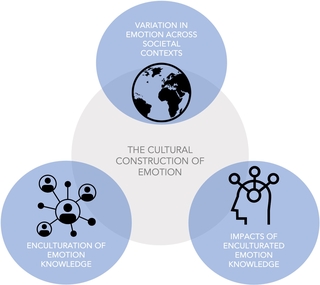
Research Overview
Our research on emotion is anchored in the psychological constructionist tradition, which proposes that emotions are the products of multiple-domain general systems, including the conceptual/semantic system. Emotions like sadness and fear are hypothesized to be populations of diverse instances. This hypothesis is consistent with recent meta-analytic evidence for strong variability of multiple features in emotions, such as peripheral physiological responses, neural activity, and facial actions. We propose that concept knowledge about emotion (i.e., instances of experiences that are treated as similar for a purpose) serves as an organizing and generative structure for emotions. Our research program is further anchored on the proposal that variability in conceptual knowledge about emotion can provide an explanatory framework for similarity and differences in the biological and social features of emotions. Research in the lab fits into three general strands, outlined below.
I. The Momentary Level of Analysis
In this research line, we examine the impact of emotion knowledge accessibility on emotion perception. Prior research suggests that simply having access to an emotion word can impact how facial behaviors of others are encoded. Ongoing research examines how the accessibility of emotion knowledge may impact how information is sampled and segmented.
II. The Cultural Level of Analysis
There are remarkable similarities and differences in how emotions are organized across societies. In this line of research, we conduct research across cultural contexts to map the extent of similarities and differences in emotion. Our prior work focused on cultural variation in the perception of facial actions, and demonstrated that not only do perceptions vary across societies in terms of the emotions inferred, but that more fundamental variartion in focus on mind versus action can be observed. Ongoing research aims to document cultural variation in social perceptions based on mind versus action and to unpack the sources and consequences of this variation.
III. The Individual Level of Analysis
Not all individuals share the same emotional repertoire. For example, people vary in how they use concepts to distinguish between experiences. Some people appear to distinguish between emotions with a high degree of precision, suggesting that their concepts are highly distinct and precise. Other people do not reliably distinguish between similar emotional states, and instead appear to only make broad affective distinctions. This individual difference, granularity (also known as differentiation), is correlated with a range of markers of well-being, but we lack mechanistic accounts of these relationships. Ongoing research in this line investigates why some individuals may be more granular than others (e.g., considering general cognitive fucntions) as well as the interpersonal consequences of granularity.